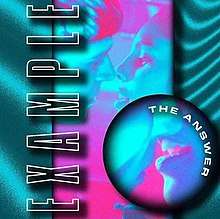The Answer (Example song)
"The Answer" is a song by British recording artist Example. It was released as a single on 19 January 2018. The song was written and produced by Example himself with the collaboration of Raoul "Diztortion" Chen[1][2] and was included in BBC Radio 1's "New Music Friday" playlist.[3]
| "The Answer" | ||||
|---|---|---|---|---|
 | ||||
| Single by Example | ||||
| Released | 19 January 2018 | |||
| Recorded | 2017 | |||
| Length | 3:09 | |||
| Label | Columbia | |||
| Songwriter(s) |
| |||
| Producer(s) |
| |||
| Example singles chronology | ||||
| ||||
Background
After a two years break to focus on his family, Example started going to the studio every day for two weeks. He wrote "The Answer" along with three other upcoming singles during the space of a week as he felt more inspired by the birth of his second child.[4] The song is taken from his upcoming sixth studio album, which he describes as "a collection of songs I want to still be performing ten years from now".[1][3] He has already written 50 songs for the project, and as of January 2018, Example had the album finished for over a year and is waiting for his label to allow him to put it out.[5]
Music video
The music video, directed by Dominic O'Riordan and produced by Hannah Bilverstone, was premiered the same day the song was released, on 19 January 2018.[1][2]
Live performances
Example performed the song on The Last Leg on 16 February 2018.[6]
Track listing
- The Answer - 3:09
- Brunelle remix[8]
- The Answer (Brunelle remix) - 2:42
- James Hype remix[9]
- The Answer (James Hype remix) - 3:10
- The Answer (Sevaqk remix featuring Wretch 32 & Cadet) - 3:01
- Acoustic version featuring Hayla[11]
- The Answer (acoustic version featuring Hayla) - 2:51
Release history
| Region | Date | Format | Version | Label | Ref |
|---|---|---|---|---|---|
| Worldwide | 19 January 2018 | Digital download | Original | Columbia Records | [7] |
| 26 January 2018 | Brunelle remix | [8] | |||
| 2 February 2018 | James Hype remix | [9] | |||
| 21 February 2018 | Sevaqk remix featuring Wretch 32 & Cadet | [10] | |||
| 2 March 2018 | Acoustic version featuring Hayla | [11] |
References
- Laura Johnson (January 20, 2018). "Example Releases Video For New Single The Answer". Stereoboard.
- "The Answer - Example". Vevo. January 19, 2018.
- "Example releases brand new single 'The Answer' today". Pressparty, Columbia Records (UK). January 19, 2018.
- James Cabooter, Sam Mayers (January 20, 2018). "Example inspired by kids to get creative after two year break". Daily Star.
- "Example returns with new single The Answer". Bang Showbiz, MSN. January 21, 2018.
- https://twitter.com/thelastleg/status/964637016293085185
- "The Answer - Single by Example". Apple Music, iTunes (US). January 19, 2018.
- "The Answer (Brunelle Remix) - Single by Example". Apple Music, iTunes (US). January 26, 2018.
- "The Answer (James Hype Remix) - Single by Example". Apple Music, iTunes (US). February 2, 2018.
- "The Answer (feat. Wretch 32 & Cadet) [Sevaqk Remix] - Single by Example". Apple Music, iTunes (US). February 21, 2018.
- "The Answer (Acoustic Version) [feat. Hayla] - Single by Example". Apple Music, iTunes (US). March 2, 2018.